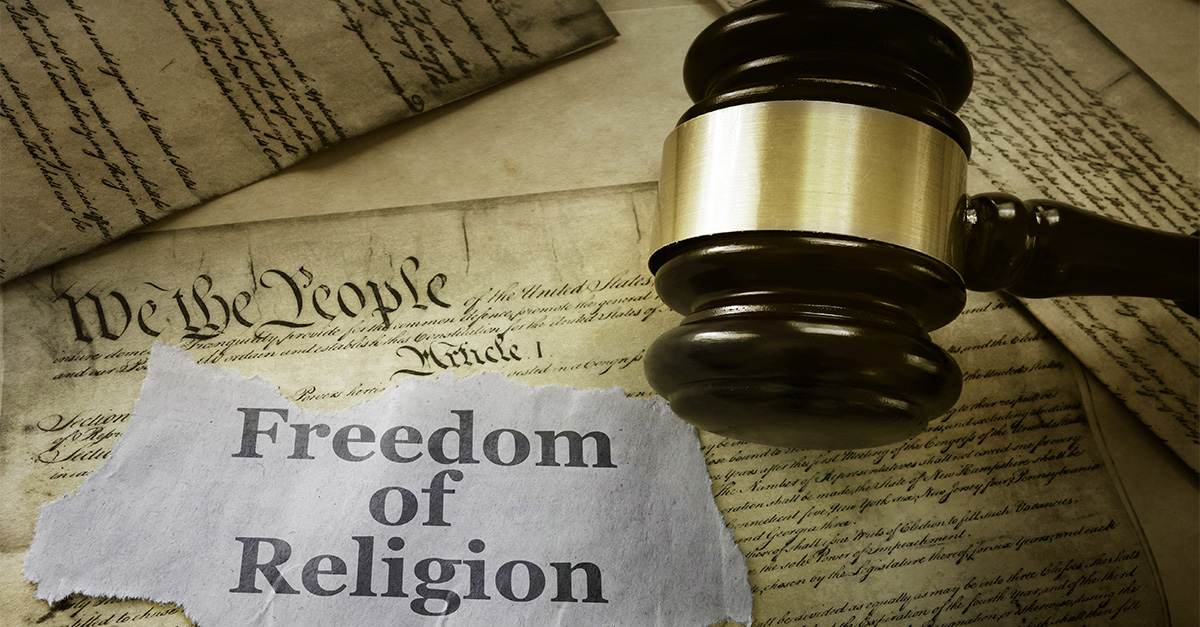


Get a free copy of Parental Rights & Education when you subscribe to our newsletter!

“Federal law protects employees’ ability to live and work according to their religious beliefs. Yet the Brownsburg school district ignored the law, deciding Mr. Kluge’s religious views couldn’t be tolerated, revoked his religious accommodation based on the grumblings of a few, and forced him to resign on pain of termination.”
–John Bursch, ADF
A panel for the U.S. Court of Appeals for the Seventh Circuit ruled against a teacher who was forced to resign after he refused to call transgender students by their preferred names and pronouns, saying that it violated his religious beliefs.
Indiana’s Brownsburg Community Schools implemented a rule requiring teachers to use a transgender student’s preferred name and pronoun, but music teacher John Kluge filed for a religious accommodation. Before the 2017-2018 school year began, the school agreed in writing to allow Kluge to use only the students’ last names.
The faculty adviser to the Equity Alliance Club and some parents of transgender students began complaining. Principal Bret Daghe encouraged Kluge to resign. The school then told faculty that the last name option would not be allowed. Kluge argued that the change violated the written agreement, but he agreed to resign to avoid being fired.
Though Kluge filed his opening brief with the Seventh Circuit Court on October 1, 2021, the three-judge panel waited until earlier this month to deliver its ruling. It ruled 2-1 that the school had a “legitimate, nondiscriminatory reason” for pushing Kluge out.
The two judges relied on a test known as the Hardiman standard, handed down in a 1977 Supreme Court case, which says that businesses can refuse religious accommodations if they cause “more than a de minimis cost,” or more than a trivial impact, on their business.
The court ruled that Brownsburg Community Schools allowed Kluge to continue his practice of using last names through the end of the school year despite evidence it “proved harmful to students and the learning environment.”
Filing a partial dissent was Judge Michael Brennan, who argued that the ruling means that “being offended by an employee’s religious practice [is] enough” to refuse religious accommodations.
The Seventh Circuit’s ruling is in direct contrast to the Sixth Circuit’s ruling more than two years ago. In that case, Shawnee State University took disciplinary action against professor Dr. Nick Meriwether for refusing to use a student’s preferred pronouns. The Sixth Circuit wrote,
“Traditionally, American universities have been beacons of intellectual diversity and academic freedom. They have prided themselves on being forums where controversial ideas are discussed and debated. And they have tried not to stifle debate by picking sides. But Shawnee State chose a different route: It punished a professor for his speech on a hotly contested issue. And it did so despite the constitutional protections afforded by the First Amendment. The district court dismissed the professor’s free-speech and free-exercise claims. We see things differently and reverse.”
Shawnee State University paid a $400,000 settlement to Meriwether.
Alliance Defending Freedom (ADF) represents both Meriwether and Kluge. ADF says it has asked for an en banc hearing by the full court of Kluge’s case.
In an unusual move, the Seventh Circuit’s panel ruling was released just a week before the Supreme Court heard oral arguments in a case which will examine the Hardiman test.
“No employer should force an employee to speak contrary to his religious beliefs, and Title VII’s religious-accommodation provision exists to prevent that from happening. This Court should grant the petition; wait until the Supreme Court resolves Groff v. DeJoy…; then rehear this case en banc to correct the panel’s errors and revise this Court’s Title VII precedent in light of Groff and the many other decisions cited above,” ADF wrote in its request.
In Groff v. DeJoy, the Supreme Court will decide whether the U.S. Postal Service violated worker Gerald Groff’s right to religious accommodation when it required him to work on Sundays. The High Court is expected to rule on the case in the summer, which could overturn the Hardiman test altogether.
John Bursch, senior counsel and vice president of appellate advocacy for ADF, stated,
“Federal law protects employees’ ability to live and work according to their religious beliefs. Yet the Brownsburg school district ignored the law, deciding Mr. Kluge’s religious views couldn’t be tolerated, revoked his religious accommodation based on the grumblings of a few, and forced him to resign on pain of termination. The school district’s decision violates Title VII which makes it unlawful to discriminate against someone on the basis of religion. We are asking the full 7th Circuit to take this case, reverse this unlawful decision, and rule on the side of religious freedom.”

This ruling says that American citizens only have the right to religious accommodations if no LGBT person is offended. That means that those with unapproved religious beliefs must choose between losing their job (or never being hired in the first place) or compelled to profess a view or take actions that they do not agree with even though it goes completely against their religious beliefs. This is a clear violation of the First Amendment rights to the free exercise of religion and free speech.
The good news is depending on how the Supreme Court rules this summer, the Seventh Circuit could be forced to re-hear this case.
In West Virginia State Board of Education v. Barnette, the Supreme Court ruled that children could not be forced to stand, salute the flag, or say the Pledge of Allegiance. The Court wrote that schoolchildren who are Jehovah’s Witnesses had the right not to say the Pledge of Allegiance because it violated their religious beliefs. Justice Robert H. Jackson wrote,
“If there is any fixed star in our constitutional constellation, it is that no official, high or petty, can prescribe what shall be orthodox in politics, nationalism, religion, or other matters of opinion or force citizens to confess by word or act their faith therein.”
Schools and courts who require teachers to use preferred pronouns or names have prescribed what is orthodox and force them to confess by word and act their faith in LGBT orthodoxy. That means schools are demanding adherence to a state-mandated religion, which violates the Establishment Clause.
All Americans should hope and pray the Supreme Court rules righteously in favor of religious liberty in Groff v. DeJoy, effectively overriding the Seventh Circuit’s opinion. If it doesn’t, all of us could soon be forced to speak or act in ways that violate our convictions.
Proverbs 12:19, ESV, says,
“Truthful lips endure forever,
but a lying tongue is but for a moment.”
There is much pressure for everyone to give in to transgender ideology and just “speak the lie.” Whether it is the fear of losing your job, being called a bigot, offending someone, or even concern over the claims that refusing to go along will cause children to commit suicide, it can be difficult to stand up for the truth. In a world going mad, however, what children — and adults — need most is the truth.
These lies may come from those with power and influence, but the truth comes from a higher source: God and His Word.
Tanner Cross, a Christian and a P.E. teacher in Loudoun County, Virginia, stood up for truth in 2021 when he stated during a school board meeting:
“I love all of my students but I will never lie to them, regardless of the consequences. I’m a teacher, but I serve God first, and I will not affirm that a biological boy can be a girl, and vice versa, because it’s against my religion, it’s lying to a child, it’s abuse to a child, and it’s sinning against our God.”
This is the way — not by compromising your faith or trying to appease would-be tormentors. As Soviet dissident Alexander Solzhenitsyn wrote in the Gulag Archipelago,
“The simple step of a courageous individual is not to take part in the lie. One word of truth outweighs the world. In keeping silent about evil, in burying it so deep within us that no sign of it appears on the surface, we are implanting it, and it will rise up a thousand fold in the future.”
Like Kluge, Cross was fired by his school for standing up for his faith. However, the Virginia Supreme Court eventually reinstated him to his teaching position, ruling that his Constitutional rights had been violated. If the U.S. Supreme Court also follows the Constitution, Kluge’s rights will be vindicated as well.
Ready to dive deeper into the intersection of faith and policy? Head over to our Theology of Politics series page where we’ve published several long-form pieces that will help Christians navigate where their faith should direct them on political issues.
Christian conservative news and issues that matter. Curated just for you!
